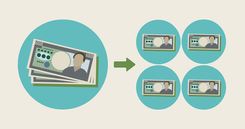Debit cards are used to finance expenses that have already been incurred, while credit cards are intended to finance credit purchases. The main difference between the two is that when we use a debit card, the money is deducted directly from our bank account, while with a credit card the money is added to the outstanding debt.
In addition, debit cards do not charge interest or additional fees, while credit cards charge interest and additional fees. Therefore, if you want to pay to finance purchases in installments, credit cards are the best option. But if you want to use your money immediately to pay for your purchases without having to worry about interest or additional fees, then a debit card would be the best option.
Key features
Debit cards and credit cards share many similarities, but there are some important differences that customers should be aware of. These differences are key to helping consumers decide which is the best option for their financial needs.
Key features:
Debit cards connect directly to a bank account, so the account balance is debited each time a purchase is made. Credit cards offer a credit limit based on a prior credit evaluation. Customers can access the limit if they pay the bill in full by the due date, but they can also choose to pay only a minimum and accrue interest.
Debit cards have fewer fees associated with them. Many banks do not charge fees for international transactions or purchases, while credit cards typically charge additional fees. Credit cards also offer rewards programs and contain greater protection against fraud or theft.
Advantages of debit cards
Debit cards are an excellent alternative for paying for goods and services. These cards offer a number of advantages that make them more convenient than other forms of payment. The main advantages of debit cards are the ease of making purchases, security and control over spending.
Debit cards provide security in payments, since the money is withdrawn directly from the bank account. This means that there is no risk of indebtedness as with credit cards. In addition, they allow better control of expenses and avoid overspending, since only the money available in the account can be spent.
Another advantage is the ease of making purchases. Debit cards are accepted at almost all merchants, which makes it easier to make transactions. In addition, many banks offer special programs for their debit card customers, such as rewards and discounts.
Advantages of credit cards
Credit cards have numerous advantages for users, including greater flexibility in the use of money, since there is no need to have cash on hand when making a purchase. Likewise, the credit card allows purchases to be made on credit, which makes it ideal for acquiring products or services immediately without having the cash at the moment.
How to choose a card
A debit card or credit card is an increasingly common banking tool today. Both facilitate the payment of purchases and expenses, although they have important differences. Before choosing one or the other, it is important to know the features and benefits they offer in order to make the right decision.
The main aspects to take into account are: the credit limit, interest and commissions, the costs associated with the use of the card and the channels for making payments.
Therefore, to choose a card you should compare the different products available on the market to determine which one best suits your financial needs. The issuing bank or entity will provide information on the requirements for obtaining a card, including how much money can be spent and what the associated costs are.












